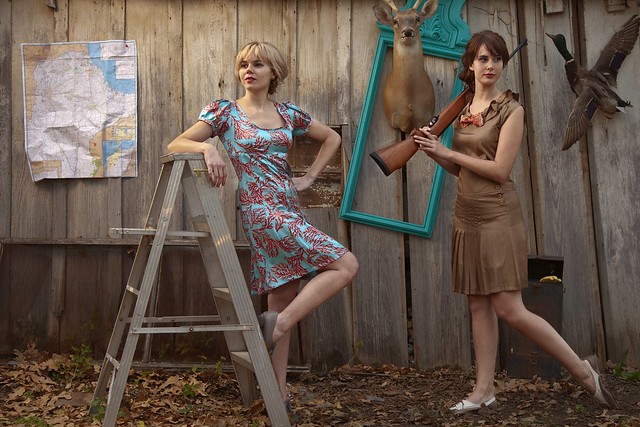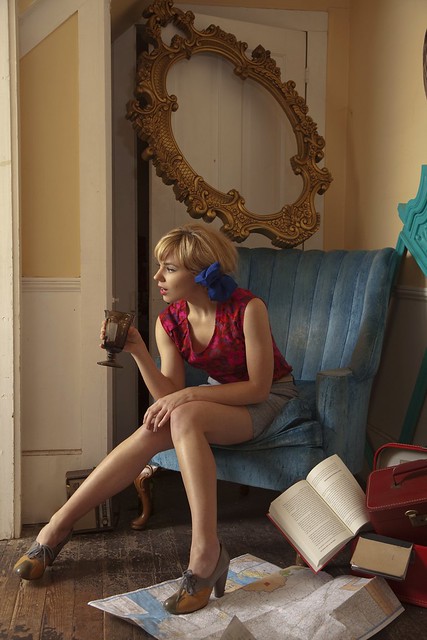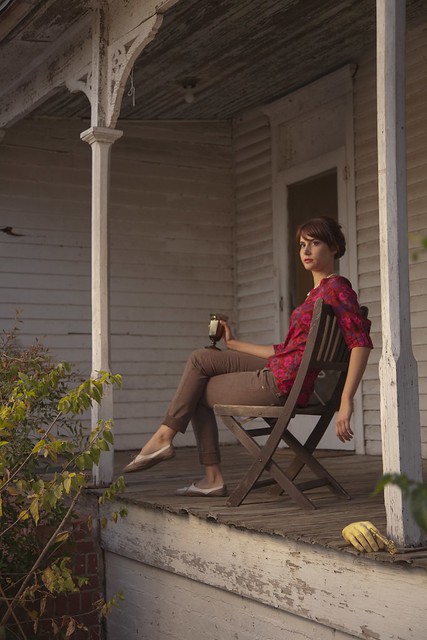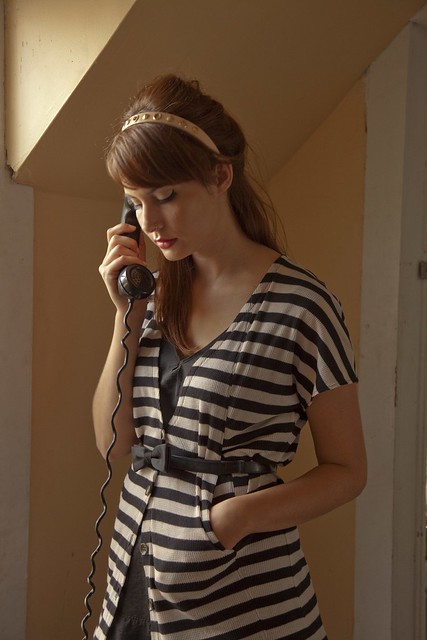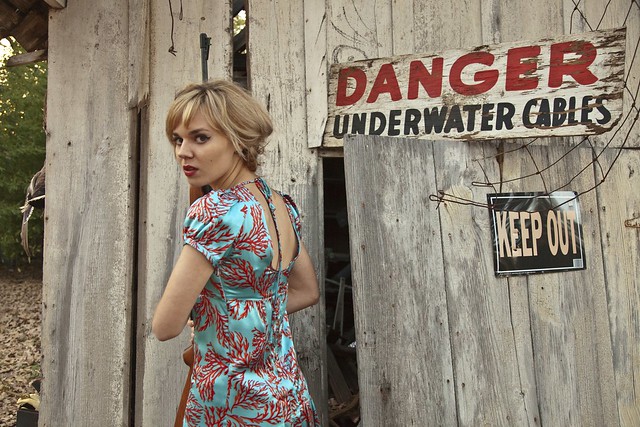Here's another piece from Chris over at Stage Directions. We always enjoy reading his heady, thoughtful musings on theatre and the like. In this one, Chris goes to check out a play at Art Six and winds up ruminating on the importance of truth in art, connecting the play to the recent This American Life episode, "Retraction." Read through and let us know what you think.
Alan Bounville in WHEN PEOPLE LEAD
On Sunday night, I went up to Art 6 in Denton to work on the musical I am writing with a couple of the owners of the shop. I didn’t expect to run into a production happening in the back room but when I arrived, there was something being set up in the back room. Beginning Spring Break is always a challenge, I almost always end up wasting the time and not completing the stack of tasks that I have set for myself. One of the tasks was to have a new blog post and the week wasn’t looking like it was going to bring anything my way. Then, a couple of things happened; Mike Daisey, the revered monologuist cum activist was deposed from his throne by his own hand and I found myself as the member of a small audience sitting in on WHEN PEOPLE LEAD. Alan Bounville wrote the play from a collection of interviews and claimed “verbatim” theatre in that respect. He is involved in a movement called Into The Light which supports people sharing their stories regarding the LGBTQ movement and Bounville is walking across the country sharing his story and trying to build awareness for the struggle for equal rights. Pushing a large cart with a rainbow flag, he began his walk in Seattle and came through Denton on Sunday with little promotion around his production. The play itself is a loose narrative that shares interviews and his own experience as “local color.” Bounville is first an activist and his acting showed commitment if little depth. There were a couple of the monologues, mostly from older men who participated in actions years ago that were quite moving; the story of one man caring for his dying partner and trying to find an apartment was the highlight of the evening for me. I can’t characterize the piece as anything but agitprop, there was a moment when video from a die-in in Grand Central played behind Bounville shouting “Civil Rights Now!!” repeatedly that perfectly captured the essence of the piece. Within the stories, the undercurrent of activism was never far below the surface. While I understand, and fully support, the quest for rights that many LGBTQ people struggle for daily, as a straight audience member, I felt out of place. Many of the issues that Bounville talked about and showed in performance were so specifically tailored to a queer audience that I felt like an oppressor sitting in the audience. I had planned to talk to him after the show but many of the audience (7 in all) were talking to him about their own experiences and I didn’t feel that my “talk to me about your process” had a place in the discussion. Bounville wore his activist flag on his sleeve and bragged about his own hunger strikes and familial problems within the wider context of the struggle. The art was sublimated to his own experience.
“Why is this a problem?” you might ask.
It isn’t, for Bounville. Would be my answer. For Bounville.
Now to the larger issue. I have been listening to This American Life since at least 1997 and have missed very few episodes. Running, cycling or working around the house, TAL has been the soundtrack of a good portion of my life. I also listen to Studio 360 and the episode about Nikola Tesla was the first time that I hear of Mike Daisey. The story that he told in that episode was compelling and laced with historical details. History aside, I never thought about the veracity of his points; history is falsifiable not subjective (arguably) and so the stories he told were not something I spent a lot of time thinking about. Then, sometime last week, I heard about the retraction episode. Newspapers, magazines and websites are where I have encountered retractions, TAL didn’t seem like the kind of place where a retraction makes sense. Then I did some research into the story. If you haven’t followed the story here it is, in brief.
Mike Daisey, one day, decided to look deeply into where his favorite devices come from when he saw some pictures on a website that were found on an iPhone that had been taken in the factory where they were made. He booked a trip to China and spent some time in and around the Foxconn plant where many Apple devices are built. He painted a bleak picture of overwork, underage workers, unsafe working conditions, repetitive motion injuries, illegal unions and a police state-style surveillance system set up in the factor. Foxconn, you may remember, was where there were a number of suicides by workers in the recent past. Daisey and his interpreter, Cathy Lee, went all around Shenzhen talking to “hundreds” of workers to corroborate the story that Daisey was sure was there. He created a monologue called “The Agony and Ecstasy of Steve Jobs” which had an amazing impact for a solo performer. Daisey put himself front and center (as in all of his shows) and was suddenly the poster child for Apple abuse, not nearly as salacious as it sounds. He even had part of his show broadcast on TAL in January and it seemed like things couldn’t get better for him. Then the debunking began. Between January and last week, reporters from all over the NPR universe found problems with Daisey’s account, billed at the Public Theatre as “non-fiction”. It was fiction. Lots of it. Moments that killed on stage were completely fabricated and Daisey was called to the carpet by Ira Glass on the Retraction Episode in a public and painful way. I don’t need to talk about the history of fabricated stories, if you have been paying attention they are all over the place. I’m not interested in jumping on the Daisey bashing bandwagon, what I am interested in is posing a question. Daisey said that his work in the theatre, fabricated or not, was effective and he stood by what he called the strongest work he had ever done. Lying, in the theatre, wasn’t an issue because the theatre is concerned with creating real, human moments. The emotional narrative that Daisey continues to tell, though in slightly altered form, is acceptable and good because he understood that his experiences in China did not add up to what he thinks of as a powerful show.
Reduced: As long as you create a strong, satisfying emotional narrative, regardless of whether you bill it as non-fiction or fiction, you have succeeded. What does this say for other performers who present something close to truth? With this story in my head, Bounville’s performance caused questions of the “verbatim” quality of his work. Was it really verbatim? Did it matter?
I talked last night with Brad McEntire about what he thought, as a solo performer, about the issue. Hopefully in the next installment we will have some of his thoughts about it. I think what came from the discussion last night that really stuck with me is that Daisey has become more of an activist and less of a playwright of late. His work has taken on a victim mentality, a holier than thou mentality that can clearly be understood by looking at some of his more recent work. I watched a video on Slate.com that showed an audience member leaving (along with a large group) and pouring water on Daisey’s papers. His response, indignation, is telling. He called on the audience member to explain himself and when he didn’t, he read into the man’s motivations for injuring him in such a personal way. Interesting to hear him on the other side of the table.
Listening to the retraction, one of the most powerful and painful moments was when Daisey came back into the studio after recording some other moments of the show and tried to point out that some of the experiences he had were real. Glass pointedly said “I don’t believe you, I can’t believe you.” Now, I don’t believe in the willing suspension of disbelief. I believe in something called “the blend” which I will not go into here. Belief in a performer and story are intertwined in my mind. If the performer doesn’t believe it, I don’t believe it. If I am supposed to be listening to something that is purported to be true and it isn’t, I don’t believe it. It doesn’t change the truth of the issue (global labor struggle) but it does affect my view of the performer/writer as a reliable narrator. If one is unreliable, doubt is cast.
So that is the question. Does it matter? I’m conflicted about it. Surely when one agrees to be held to the highest journalistic standard, as Daisey did in having his work presented on TAL, it does matter. In the theatre, I don’t know that it does. I always go in to a performance with the expectation of at least someartistic license. In an academic lecture or news conference, not so much.
More reviews and interviews of this caliber can be found at his blog.








